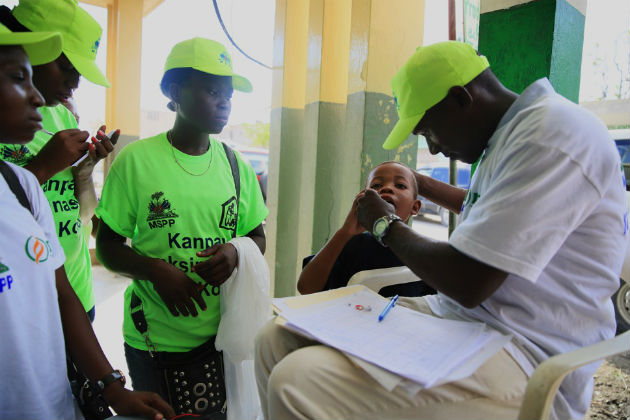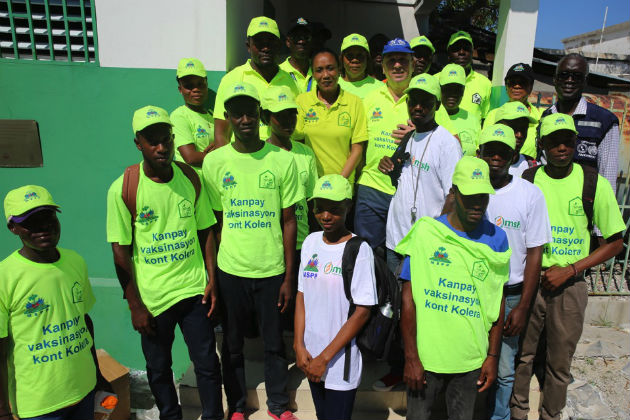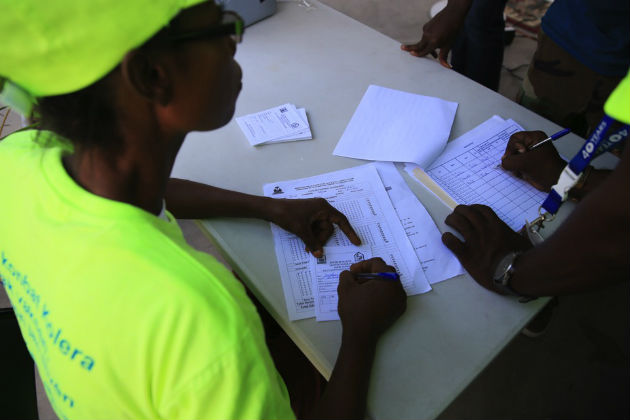More than 729 000 people in Haiti have been vaccinated against cholera to reduce the burden of severe illness and deaths in areas at high risk.
With the support of WHO/PAHO and other partners including UNICEF, International Medical Corps, the Red Cross and Gavi, the Vaccine Alliance, vaccination teams have reached more than 90% of people in the departments of Grand Anse and Sud where cholera cases had been reported and water and sanitation systems were damaged by the hurricane.
Since Hurricane Matthew struck Haiti on 4 October, more than 5800 suspected cholera cases have been reported by the Ministry of Health, while the population in need of humanitarian assistance remains at 1.4 million, and more than 175 000 people are still in shelters, according to PAHO’s latest situation report.

In the city of Les Cayes, many children were among the first groups that came to get vaccinated thanks to a strong campaign to inform the community and encourage them to come to vaccination centres. The strategy defined by the Ministry of Health, with support from PAHO/WHO, is to vaccinate people at fixed immunization centres, mobile centres and, in some cases, by going door to door.
At midday in Figuers, a rural area in the Sud Department, nurse Orcel Naika set up a vaccination post by the shore. In less than 3 hours, her team had vaccinated more than 250 people against cholera. Accordintg to WHO experts, a single dose of the oral cholera vaccine will reduce the risk of 60-70% of severe cases of cholera.
Amalia Jean Simon, aged 10, was one of the first to have the oral cholera vaccine in Les Cayes.
Patricia was one of the first people to receive the cholera vaccine with her 24-month-old son Hans Billy at the launch of the vaccination campaign.
Haiti’s Minister of Public Health, Dr Daphne Benoit, stands by a school student taking the oral vaccine at the launch of the campaign in Les Cayes. "The vaccine is an additional intervention that will help us to save lives, but does not replace the efforts that the government supports in water and sanitation," she says.

WHO/PAHO and other partners worked together with the Ministry of Public Health providing expertise and support in epidemiology, immunization, social mobilization and logistics, including cold chain to keep vaccines potent, and transport and support for vaccination brigades.
A large team of supervisors, nurses, health workers and town criers were mobilized to roll out the campaign. Pictured here is a team from partner organizations and the local health authorities, with PAHO/WHO Representative Dr Jean-Luc Poncelet and Haiti’s Minister of Public Health, Dr Daphne Benoit.

In the final stages of the campaign at the end of November, Ministry of Health officials are collecting data and consolidating results, while looking for pockets of unvaccinated people in the communes.
WHO/PAHO continues to support Haiti to rehabilitate health facilities, train health workers, and improve access to chlorinated water and other interventions to improve hygiene and protect people's health.
